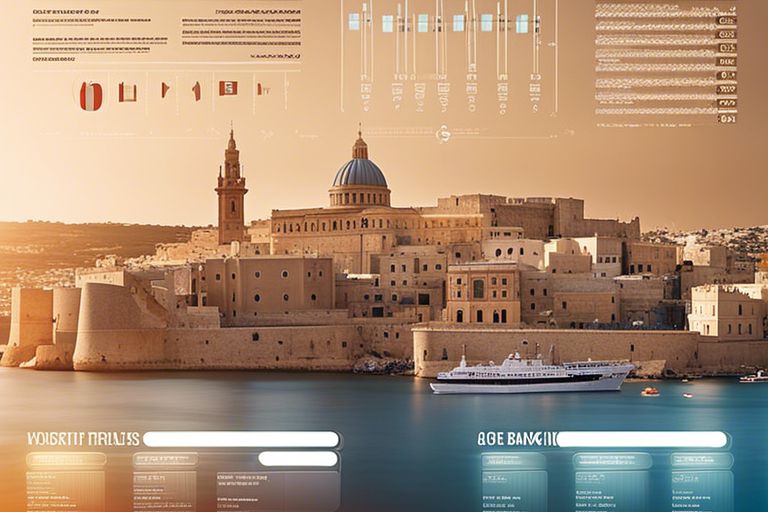Banking Trends Shaping Malta

Digitalization has revolutionized the banking sector in Malta, bringing forth a wave of disruptive trends that are reshaping the financial landscape. From the rise of fintech companies to the increasing adoption of mobile banking, Malta is experiencing a rapid evolution in its banking industry. Understanding these trends is crucial for both consumers and financial institutions to stay ahead in this rapidly changing environment. In this blog post, we will probe into the most important banking trends currently shaping Malta, exploring the positive impacts as well as the potential challenges and risks that come with them.
The Rise of Digital and Mobile Banking in Malta
Adoption of Mobile Banking Apps
Before submerging into the trends, it is crucial to understand the landscape of digital banking in Malta. Mobile banking apps have gained significant traction in recent years, with a growing number of Maltese citizens opting for the convenience and efficiency they offer.
Impact of Digital Wallets
Apps like Revolut and PayPal have revolutionized the way Maltese people handle their finances. Digital wallets enable users to store multiple payment methods, make online purchases, and even transfer money to friends and family with just a few clicks. They offer a secure and convenient alternative to traditional banking methods, making them increasingly popular among tech-savvy consumers.
Adoption of digital wallets is on the rise in Malta, with more people embracing the convenience and security they provide. These platforms not only streamline the payment process but also offer additional features such as budgeting tools and loyalty programs. Despite concerns about cybersecurity, the benefits of digital wallets far outweigh the risks for many consumers in Malta.
Regulatory Evolution and Financial Services
Malta's Regulatory Framework Adjustments
Any significant developments in the banking sector in Malta are deeply interwoven with the regulatory changes that have shaped the financial landscape of the country. The regulatory framework in Malta has undergone various adjustments in response to the evolving global financial trends, with a particular emphasis on enhancing transparency and compliance measures.
The Role of the Malta Financial Services Authority (MFSA)
An integral player in the oversight and regulation of the financial services sector in Malta is the Malta Financial Services Authority (MFSA). This governmental body is responsible for supervising and regulating all financial services activities, including banking, investment services, and insurance, to ensure the stability and integrity of the sector.
Malta Financial Services Authority (MFSA) plays a crucial role in ensuring that all financial entities operating in Malta adhere to the highest standards of compliance and risk management. The MFSA works diligently to protect consumers, maintain market confidence, and uphold the reputation of Malta as a reputable financial services jurisdiction.
Fintech Innovation and Startups
Growth of Fintech Companies in Malta
Innovation in the financial technology sector has been rapidly growing in Malta. The country has emerged as a hub for fintech startups due to its strategic location, robust regulatory framework, and supportive government initiatives. Malta’s thriving fintech ecosystem has attracted a diverse range of companies specializing in areas such as digital payments, blockchain technology, peer-to-peer lending, and insurtech.
Collaborations Between Banks and Fintech Startups
To enhance their services and remain competitive, traditional banks in Malta are increasingly forming partnerships with fintech startups. These collaborations allow banks to tap into the innovative technologies and agility of startups while providing the latter with access to a large customer base and regulatory expertise. The partnerships aim to drive innovation, improve customer experience, and create new revenue streams in the rapidly evolving digital financial landscape.
Banks are recognizing the need to adapt to the changing financial landscape and are leveraging partnerships with fintech startups to stay ahead in the industry. By combining the strengths of both traditional financial institutions and agile startups, they can create innovative solutions that meet the evolving needs of customers while ensuring compliance with regulatory requirements.
The Expansion of Green Banking Initiatives
Eco-friendly Banking Products and Services
All financial institutions in Malta are increasingly recognizing the importance of integrating environmental sustainability into their operations. From green savings accounts to eco-friendly credit cards, Maltese banks are offering a wide range of products and services that promote sustainable practices among customers. These offerings not only attract environmentally conscious clients but also contribute to the larger goal of reducing the carbon footprint of the banking sector.
Sustainable Finance Efforts by Maltese Banks
For Malta, promoting sustainable finance has become a top priority in recent years. Maltese banks are actively participating in initiatives that aim to fund environmentally friendly projects, such as renewable energy infrastructure and sustainable agriculture. By incorporating environmental, social, and governance (ESG) criteria into their investment decisions, these banks are aligning themselves with global efforts to combat climate change and promote sustainable development.
Finance: The sustainable finance efforts of Maltese banks not only benefit the environment but also the economy as a whole. By financing projects that support sustainable practices, these institutions are not only mitigating climate risks but also fostering a more resilient and prosperous future for Malta. Through their commitment to sustainable finance, Maltese banks are setting a positive example for the financial sector and contributing to the overall well-being of the country.
Challenges and Opportunities
Cybersecurity in the Digital Banking Era
Opportunities: Unlike traditional banking, digital banking presents a unique set of challenges when it comes to cybersecurity. However, with these challenges also come opportunities for banks to enhance their security measures and stay ahead of cyber threats. By investing in advanced security technologies, such as multi-factor authentication and encryption, banks in Malta can better protect their customers’ sensitive data and build trust in their digital services.
The Potential Impact of Brexit on Maltese Banking
Banking: The potential impact of Brexit on Maltese banking is a topic of concern for many in the industry. While there may be challenges in terms of regulatory changes and market volatility, there are also opportunities for Malta to attract businesses looking for a stable EU jurisdiction post-Brexit. Malta’s strategic location, English-speaking workforce, and robust regulatory framework position it as a potential hub for financial institutions seeking an EU presence.
Summing up
On the whole, the banking sector in Malta is experiencing a significant transformation driven by technological advancements, changing consumer preferences, and regulatory developments. The rise of digital banking, sustainable finance practices, and compliance with anti-money laundering regulations are key trends shaping the industry. It is crucial for banks in Malta to adapt to these trends to stay competitive and meet the evolving needs of customers. By embracing innovation, sustainability, and regulatory requirements, Maltese banks can continue to thrive in an ever-changing financial landscape.
FAQs:
How has digitalization impacted the banking sector in Malta?
Digitalization has revolutionized the banking sector in Malta, with trends such as the rise of fintech companies and the increasing adoption of mobile banking reshaping the financial landscape.
What role does the Malta Financial Services Authority (MFSA) play in the banking industry?
The MFSA is a crucial regulatory body in Malta, overseeing and regulating financial services activities to ensure stability, compliance, and consumer protection in the banking sector.
How are traditional banks in Malta adapting to the digital financial landscape?
Traditional banks in Malta are forming partnerships with fintech startups to leverage innovative technologies, enhance customer experience, and stay competitive in the evolving digital financial landscape.
What sustainable finance initiatives are Maltese banks involved in?
Maltese banks are actively participating in sustainable finance initiatives, funding environmentally friendly projects and incorporating ESG criteria into their investment decisions.
What challenges and opportunities does digital banking present for cybersecurity in Malta?
Digital banking in Malta poses cybersecurity challenges, but there are opportunities for banks to enhance security measures through advanced technologies like multi-factor authentication and encryption.
Recommended Posts

Explore the Thrill of Malta iGaming
May 8, 2024

Banking in Malta – A Guide for Beginners
May 8, 2024

Malta’s Best Gelato Spots
May 7, 2024
